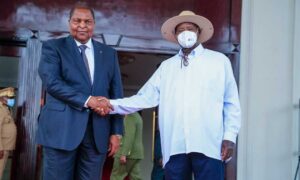President Yoweri Museveni delivered an optimistic state of the nation address on Thursday, highlighting Uganda’s economic progress. He emphasized that despite some mistakes by certain actors, Uganda is on the right track. “Uganda’s economy is moving forward, mistakes by some actors notwithstanding. Given our correct position, we are unstoppable as everything is in place,” Museveni stated.
The address, held at Kololo Independence grounds, is a platform for the president to provide an overview of the country’s economic, political, and social developments over the past year and forecast future prospects.
Impressive Economic Growth
In his speech, Museveni detailed Uganda’s significant economic growth. Since 1986, the economy has grown from $1.5 billion to $55 billion using the forex exchange method and $180.29 billion by the purchasing power parity (PPP) method. Uganda has now achieved lower middle-income status.
Foreign Interference and National Resilience
President Museveni took a firm stance against foreign interference in Uganda’s internal affairs, assuring that these external influences pose no real threat. “The foreigners interfering in our internal affairs are not a threat at all,” he asserted. Museveni credited the NRM government’s correct philosophical and ideological positions for diagnosing and addressing Uganda’s problems, leading to accelerated economic growth.
Importance of Regional Integration
Museveni stressed the importance of regional integration for sustained economic development. He highlighted that internal markets are insufficient for Uganda’s increasing production levels. “When wealth creators get serious with production, when they increase the production of goods and services, the internal market is no longer enough. We need the East African market, we need the African market, and we need the global market,” he explained.
Surplus Production and Market Needs
Uganda’s sugar production has reached 600,000 metric tonnes annually, but the local market can only consume 380,000 metric tonnes. Similarly, the country produces 5.3 billion litres of milk annually, with local consumption at just 800 million litres. Cement production stands at 6.4 million metric tonnes, while internal demand is only 2.4 million tonnes. This surplus production necessitates broader market access, which regional integration can provide.
Benefits of COMESA and EAC
Museveni emphasized that the East and Central African markets are crucial for absorbing Uganda’s surplus goods. The COMESA region currently purchases goods and services worth $2.157 billion from Uganda. “The NRM was right to distil the principles of patriotism and Pan-Africanism and to oppose groups that were pushing for parochialism in Uganda and Euro-centrism globally,” Museveni remarked.
Global Market Access
With a united regional market, Africa can negotiate better access to global markets, including the European Union, USA, China, Russia, the Gulf, and India. Museveni highlighted the importance of securing regional markets first before accessing global ones.
In conclusion , President Museveni’s state of the nation address painted a promising picture of Uganda’s economic future. By focusing on regional integration and maintaining correct ideological positions, Uganda aims to sustain its economic growth and expand its market access.



























